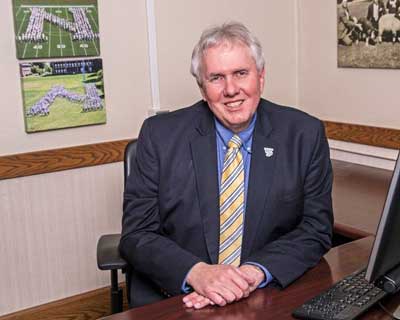Message from William Penn University President John Ottosson

John E.E. Ottosson, Class of 1984
President, William Penn University
Education has long been viewed as the key to a better life—an education, when used wisely, can open doors that would remain hidden to our view otherwise. American Author Brandi L. Bates explains her experience this way, “Wrote my way out of the hood…thought my way out of poverty! Don’t tell me that knowledge isn’t power. Education changes everything.”
It certainly has been my experience that education changes everything. In many ways it is on this principle that William Penn University began. It was the intent of our founders to make education accessible to all because education could benefit everyone and thus, should be open to all regardless of gender, race, religion or age.
When exploring our history, it becomes evident that this has been our guiding principle since inception. Our first graduate was female in 1875, our first African-American graduate in 1902. In 1947, a 247-member student body, comprised of individuals from 24 states, two other countries and 22 different religions came to Oskaloosa, Iowa. In my time as a student at Penn, that same diversity continued. I matriculated with individuals from across the country and with “adult” learners—people who were many years older than the “traditional” student—we were all at Penn looking for an opportunity.
As education evolved over the decades, William Penn, to remain true to its mission, needed to look at new delivery systems to continue to make education accessible to all. It was obvious that many people who would benefit from an education could not stop working to attend school during the day. This introspection led to the origins of what is now OLE—our Online and Evening program in 1996. This platform, in addition to our synchronous online teacher education degree, as well as the design of our Bachelors of Nursing completion strategy, were formed to make a degree more accessible to all.
Our traditional campus continues to welcome students from all walks of life and from all areas of the world. Our current student body of almost 1,000 is comprised of students from 42 states and 20 other countries. This experience prepares students for future opportunities in a way that is hard to replicate. Helen Keller said, “The highest result of education is tolerance.” Learning with, working with, and becoming friends with people who do not look, think or believe like us prepares us for success. Malcolm Forbes puts it this way: “Education’s purpose is to replace an empty mind with an open mind.” That is what William Penn has undertaken since 1873.
I invite you to join the Penn experience as you continue your pursuit of higher education, regardless of the delivery system. The world is changing at an amazingly fast pace. We cannot sit still in our learning and expect to contribute to society or better our life if we do not keep pace. American author, futurist and businessman Alvin Toffler unerringly said, “The illiterate of the 21st century will not be those who cannot read and write, but those who cannot learn, unlearn and relearn.” Perhaps the most notable accomplishment of education is realizing that one must continue to learn, since it is impossible to learn enough. This is the promise of Penn, if undertaken by our students with real intent.
John E.E. Ottosson, Class of 1984
President, William Penn University
